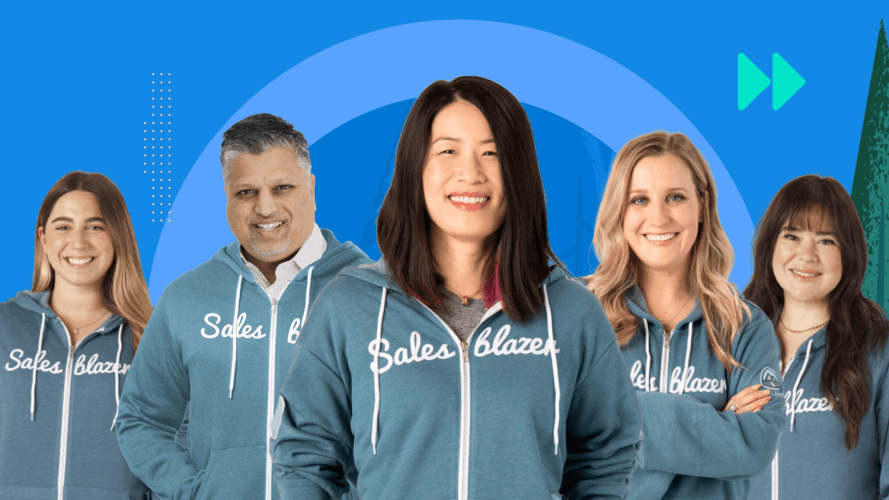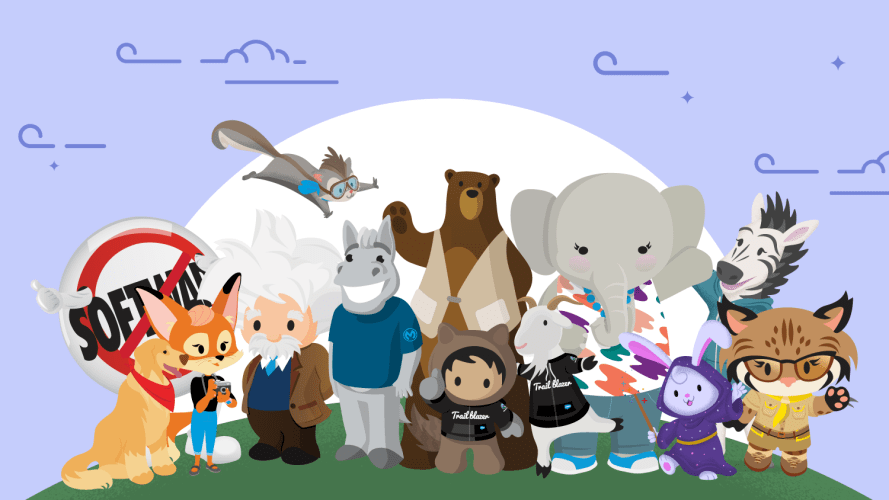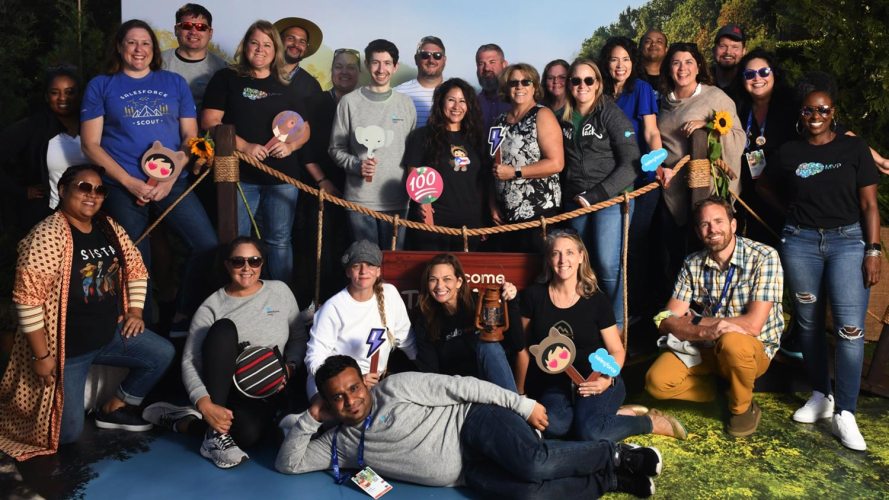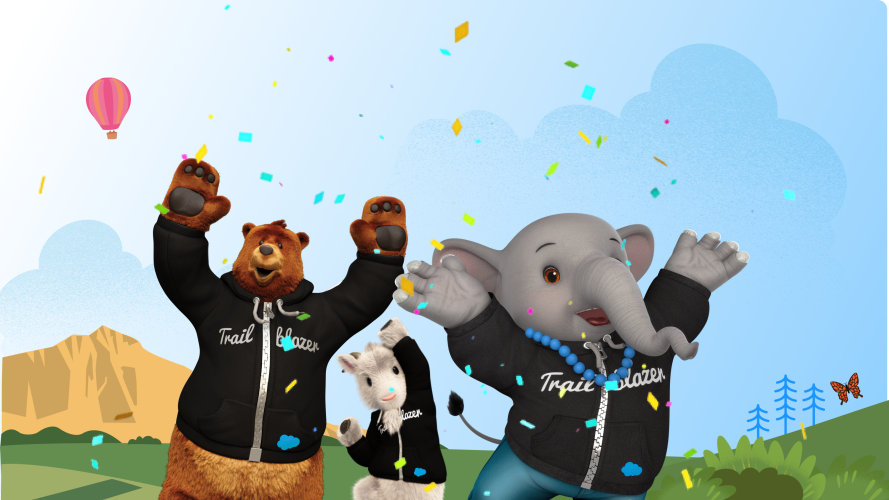Land a Tech Job Without a Tech Background – Here’s How You Can Make The Leap
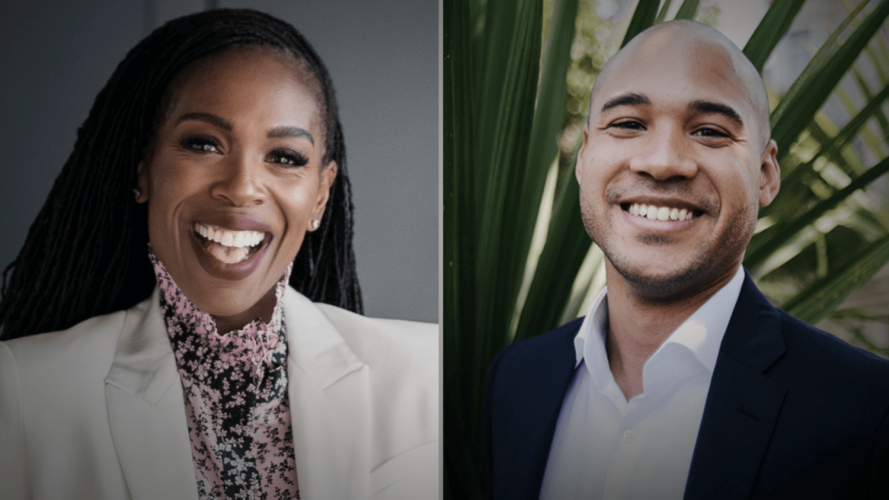


Michael Ellison, founder and CEO of the nonprofit CodePath, has advice for the underrepresented and those on a nonlinear career path.
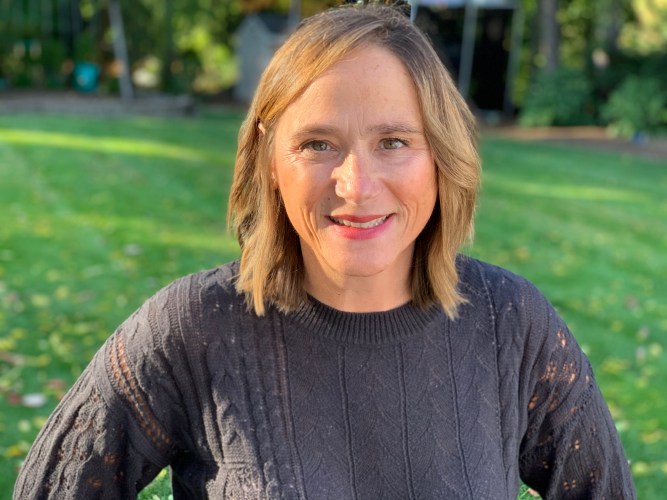
Lisa Lee
The path to success is not always linear. The “traditional” trajectory from high school to college to a job does not apply — or work — for everyone. Thankfully, some entrepreneurs are creating opportunities by redesigning college programs to help underrepresented students land plum jobs.
One of them is Michael Ellison, founder and CEO of CodePath, who spoke with Salesforce Chief Philanthropy Officer Ebony Beckwith on the latest episode of #BossTalks, Beckwith’s series on Salesforce+.
CodePath aims to eliminate educational inequity in tech by providing underrepresented and underserved college students with free coding courses, mentorship, and career support throughout college. The end goal is to increase representation and diversity in technology careers.
It’s just the latest endeavor from Ellison, who founded three nonprofits and three tech companies beginning in college. It’s all the more impressive when you consider his hardscrabble youth.
Table of contents
Scroll down to read the transcript and watch the episode of #BossTalks.
Don’t let your past define you
Ellison’s success — he has founded several nonprofits and tech companies — was anything but assured given his childhood challenges. He describes himself as having been low-income, with an incarcerated father and divorced parents. He was even homeless for a while.
“It was that type of situation where you wear the same clothes every day … [and] you have Pop-Tarts® for breakfast, lunch, and dinner. I was a fairly good student despite everything.”
He attended college, was interested in computer science and initially didn’t feel prepared for the work. But his ambition was greater than his reticence, and he was determined not to let his past dictate his future. “And so I started my first nonprofit when I was 19 years old, and then I started two additional nonprofits. And then three tech companies, including one that was acquired for a little over $3 billion just last year. My experience is proof that it doesn’t really matter where you start, it’s about where you finish that really matters. And that’s the reason why CodePath exists.”
How those on a non-traditional path can get a foot in the door
Ellison identified four keys for people on a non-traditional education and career path.
1. Start with your own psychology
He encourages young people to invest in themselves, and identify habits that help build confidence. He also meditates to center himself, and writes a “daily gratitude” of what he’s thankful for, specifically, what he did well the day before.
2. Find a community
Nobody succeeds in a vacuum. Ellison extols the benefits of connecting with others along the journey. “Find mentors, find teachers, find peers,” he said. “If you’re going to the gym, you’re more likely to stick if you have your gym buddy. That’s incredibly important, that community piece.”
3. Always be learning
Upskilling, in any industry and at any level, is crucial. To avoid stagnation, individuals should leverage the multitude of on-demand learning programs to keep skills up to date and gain exposure to areas you perhaps haven’t considered.
4. Be aggressive in finding opportunities
The last piece is creating the opportunities that make you visible to employers. “Be
as aggressive as you possibly can to connect with people who are already [where] you want to go,” Ellison said. “You’ll be shocked by how friendly and supportive people will be that you’ve never met, if you just share your story.”
The difference between mentors, champions, and sponsors
The path to success is lined with people who support you on your journey, and everyone has a specific role to play. It’s important, Ellison said, to identify and distinguish these roles. “I think of the people who are my mentors as giving me advice,” he said. “They’re giving me the pointers, I’m regularly checking in with them.” Champions, he said, sing your praises, and make introductions and connections for you either inside or outside your organizations. Finally, sponsors help position you for advancement, whether for a promotion, funding, or something else.
“You need to have all three of these, and you need to be very intentional,” said Ellison.
It’s never too late to pursue a new path
If you commit to regular learning, there will always be new opportunities. That said, it’s never too late to blaze a new trail, especially in tech which, as Ellison pointed out, reinvents itself every few years. “Every time you hear a new buzzword, a new technology … blockchain, [the metaverse], that means that there’s a new opportunity for learning. Skills quickly go out of date in tech … which is a great opportunity for those that are brand new, because it means a new technology comes along and you just dive into that.”
Want to be a #Boss?
Catch up on every episode of #BossTalks — all streaming now on Salesforce+



Watch the full conversation between Beckwith and Ellison, and read the interview transcript:
Episode transcript:
Ebony Beckwith:
Hello everyone, and welcome to a brand new season of BossTalks. A series featuring candid career conversations with people who are changing the game in their respective industries.
Today’s episode centers on something I am incredibly passionate about, and that’s embracing the career path less traveled. And what I mean by that is not everyone goes the traditional route from high school to college, or from college directly into the workforce, or even to college at all. There’s more than one path to success. And that’s a good thing. So to help me explore this topic, I’ve invited Michael Ellison, founder and CEO of code path CodePath. CodePath is redesigning college programs to help underrepresented students land coveted jobs. Michael, welcome to Boss Talks
Michael Ellison:
Thanks for having me. I’m excited too.
Ebony Beckwith:
Now, you have such a unique background, and I wanted to give everyone a chance to get to know you just a little bit better. Canyou take us back to the early days of growing up with a single mom, to your experience in school, and then eventually getting into tech?
Michael Ellison:
Yeah, well, I was low income. When I was five years old, my father was incarcerated, my parents split up, and we became homeless for a time. And it was that type of situation where you wear the same clothes every day, you’re going to school. We do pop tarts. Sometimes I talk about pop tart poor; pop tarts for breakfast, lunch, and dinner. I think the thing that was most challenging was, maybe sometimes you have good teachers, sometimes you don’t. I was a fairly good student despite everything.
Got into college, was excited about majoring in computer science because people told me it might be something I could be good at. And unfortunately, I just didn’t feel prepared. But I was also a pretty ambitious young person. I didn’t want my past to predict my future. And so, I started a first nonprofit when I was 19 years old. And then I started two additional nonprofits. And then three tech companies, including one that was acquired for a little over $3 billion just last year.
So my experience, I think it’s proof that it doesn’t really matter where you start, it’s about where you finish that really matters. And that’s what is the reason why CodePath exists. I don’t want to hear stories about how, if you’re an underrepresented minority in tech that has made it and been successful, you had to get lucky. Instead, we want to redesign the pathways, so that by default underrepresented minorities and people from low income first generation backgrounds are able to reach their full potential, and feel like there’s a place for them to thrive in tech, and any top industry.
Ebony Beckwith:
I would love to hear your advice for those on a similar non-traditional path who are trying to get their foot in the door. What advice do you have for them?
Michael Ellison:
So I have four key pieces that I think about in the order that I’d recommend. One is to start with your own psychology. Start with yourself, investing in yourself. What are the daily, weekly habits that you’re doing that help to build your confidence? What are the stories that you’re telling yourself? There’s different exercises I like a lot. I like to do a morning meditation, I like to write a gratitude exercise, a daily gratitude of what I’ve been grateful for. I think it is also very important to reprogram how you think about the past. Sometimes a lot of people can be very self critical. So I do this acknowledgement exercise and I say, “I give myself credit for things I did well the day before.” And there’s a way of reprogramming yourself. I think it starts there with your psychology, how you’re treating yourself, how you’re helping to prepare yourself to do something really hard.
And then I think this next step, number two is about community. Find mentors, find teachers, find peers. If you’re going to the gym, you’re more likely to stick if you have your gym buddy. So that’s incredibly important, that community piece. How are you going to keep going for this big change that you want to make? Find people who are also trying to be on this journey with you. And then, number three, skills. Technology is hard, especially trying to get to the level that’s going to give you the upper mobility you want. There’s lots of great programs out there. I’ll mention Trailhead is one program, one opportunity to get some of the skills.
And then, I’d say there’s a last piece where you can have the skills, but you don’t have the opportunity, you’re still invisible to employers. So that last part of, after you gain the skills, you put in the time, you put in the work, you have the community, be aggressive as you possibly can to connect with people who are already in the door at the places that you want to go to. You’ll be shocked by how friendly and supportive people will be that you’ve never met, if you just share your story.
Ebony Beckwith:
I really want to get tactical about what people need to do to get a job in tech, or really in any industry. Especially if you’re not coming through traditional pipelines with that four year degree. So what are the courses or programs you’d recommend, or even organizations or groups you recommend people join?
Michael Ellison:
I’m very biased in favor of free educational opportunities because there’s so many fantastic opportunities. Anything, from a FreeCode Camp … I did mention Trailhead earlier, so I want to sing your praises as well. Of course CodePath, we’re completely free, and teach thousands and thousands of students as well. I want to give a shout out to Career Karma, because I mentioned Career Karma is a tech startup that is really focused on community from a coding standpoint, and they don’t charge anything as being part of this community. So I love the programs that are going to get you connected, and meet with peers, and have that positivity from day one to help you to keep going.
Practically speaking though, just to be real you have to be… I mentioned aggressiveness earlier, but I’ll give you an example from early in my career. So I started that nonprofit when I was 19. Didn’t know anyone, didn’t have any connections. We literally Googled, “How do you raise money on Google?” That was our plan, that was our strategy, Googled that, and then we heard that Goldman Sachs has a lot of money. So were like, “All right, we’re going to call Goldman Sachs.” I was dialing on the phone, I’m like, “Hey, my name is Michael Ellison. I’m calling from…” And we were dialing the dial number… It was like olden days a little bit, dialing the dial number. And we eventually just got to some random VP that was confused. Gave us tickets to a conference that we weren’t supposed to have. And then I end up pitching the chairman of the board at Goldman Sachs at the event I’m not supposed to go to, because I pretend that I have a ticket.
So when I talk about aggressiveness, I’m talking about finding a way to get into the room. I mean, you’re going to embarrass yourself, but you have to go anyway. I also see meetups. Oh my gosh. I see so many people that come to Silicon valley, they just show up at a meetup. And there’s all these engineers, and there’s angel investors, or there are all these people who are there. And I see people go from not knowing anyone to suddenly there’s a community, and there’s support. So, I think learning commitment, there is an emotional connection you need to have. Start there, and then, wherever your community, wherever your tribe is bringing you, follow them. And make sure you surround yourself with people who are the most talented people you can possibly find.
Ebony Beckwith:
That’s right. I love that. You got to sharpen your elbows a little bit sometimes to get on in there and pry that door open. So now you’ve got your foot in the door. Then what? Getting a job is really the first step. Then the work becomes about advancing people in leadership roles, or potentially founding your own company. Can you share more about your perspective on this? I know you have one.
Michael Ellison:
One thing I’ve been pretty good at is distinguishing different types of supporters and being very intentional. So I think of mentors, and sponsors, and champions. I think of those three different types.
And I think of the people who are my mentors, as they’re giving me advice, they’re giving me the pointers, I’m regularly checking in with them. I think of the people who are the champions. They’re singing my praises, they’re, they’re doing different introductions. And then I think of the sponsors. And these are people who you’re in your role, they’re like, “Hey, I’m going to put you here so that you get that promotion.” You’re an entrepreneur. I’m the one who’s going to give you that deal. I’m like, “How much? $200K recurring contract? Great, I’m the one.” You need to have all three of these and you need to be very intentional. You don’t need one, you need an army of all of them. And if you’re in an organization, or you’re starting a startup, or whatever, build your army of supporters. And don’t just think of them in terms of, “I need their advice, they’re my mentor”, whatever. Think of them as, “We’re going to collaborate. I’m going to add value as well, with every interaction.”
Ebony Beckwith:
This audience knows I have a bone to pick about the pipeline issue in tech. And for those less familiar, I’m referring to the fact that black workers make up only two to six percent of the workforce at a lot of tech companies. But Michael, I love your optimism. And how you say that if the pipeline doesn’t exist, we simply need to rebuild it. So what are things we can do to help create it?
Michael Ellison:
What gives me optimism is that I see if companies invest more in rebuilding the pipeline, it seems to be an unfair competitive advantage from a talent standpoint. And what I’m talking about is some of the organizations that we’ve worked with that have invested heavily in early career programs, or programs where are helping to train based on the technologies that the companies are focused on, they’ve seen that if they do an effective enough job of designing that end to end program, providing the right support in the right way, then now they have this captive audience that is extremely biased in their favor. So, getting people to the level where they’ll be able to be talented, be a good fit for your workforce. But then also, it’s a competitive war on talent, so being able to compete. But it comes with meeting those individuals part way. Give them an opportunity to be able to prove that they are as exceptional as they are, and people will surprise you.
Ebony Beckwith:
That’s right. And that grit and determination is what so many companies are looking for in their ideal worker. So it’s really a win-win for both when we can make that happen.
I want to zoom out and talk about the impact on a bigger scale. How does welcoming untapped talent help companies and our broader society begin to address deeper systemic issues of racial equality and inclusion? And I understand this is a really big topic, so we might even need a part two to this. But, what are your thoughts on it?
Michael Ellison:
Oh, I think this is really clear cut. When I think of companies talking about racial equity, then there’s one question. I’m like, “Are you creating pathways to power influence for marginalized communities? Are you doing that? Are you creating those pathways?” Because if inside of your company you’re creating these pathways for upward mobility, if you’re creating the inroads into your company, then the way that you’re going to change the culture, and the way that you’re going to change it to be a more inclusive workspace is by having these people from underrepresented communities and disadvantaged backgrounds have the pathway to be in the decision making seat. From the board, to different executive teams, to whatever, these pathways are critical. And so, I would say letting in this untapped talent is the recipe for you changing the leadership, and the dynamics, and for middle management, and whatnot. And the better organization is at doing this, the faster they’re going to transform things. They’re going to transform what the status quo looks like. So I’m completely all about, this untapped talent is going to be your tool and your opportunity to change your culture from within.
Ebony Beckwith:
Michael, I get this question a lot from friends, and family. And on my LinkedIn, where people just … They want to be in tech, they want to start coding, and they just don’t know where to start, or if it’s even too late. Do you ever think it’s too late to pursue a new path, or to get started in tech?
Michael Ellison:
No way. The tech industry reinvents itself like every five years. Every time you hear a new buzzword, a new technology … You hear about blockchain, you hear about what… Mark Zuckerberg said something about the Metaverse recently. So every time you hear a new buzzword, that means that there’s a new opportunity for learning. Skills quickly go out of date in tech. Which is a bad thing, but it’s a great opportunity for those that are brand new, because it means a new technology comes along and you just dive into that. And then you can start to become part of that ingroup, that Illuminati, those people who actually know what they’re talking about and what they’re doing.
So it’s definitely not too old. And I especially want to impress that there is a world of different opportunities. I’m more artistic. If you look at the impact tech has on culture, on movies, on music, there are so many different areas that you could be very excited about that you might not even know exists. You might be like, “Oh, I’m not a coder. It’s this one thing.” No, no, no. There’s so many different types of programmers out there. So I think anyone could find an area that they would probably at least be a little bit excited about.
Ebony Beckwith:
I know our BossTalks audience is going to love that. I know there are probably some people out there going, “Ah, thank goodness. It’s not too late.” And I just love your optimism about it. And I think it’s real, there’s so many opportunities available.
So Michael, we’ve been talking a lot about tech today. Do you think the same ideas apply to all industries?
Michael Ellison:
A hundred percent. The way things happen, I’m thinking about my second startup company where I was actually still pretty young, I was still in school. I was trying to figure out what to do. I didn’t know what I wanted to do. I was just like, “I need to do something. I did this nonprofit. What’s going to be this thing, which somehow gives me a way to have the leg up, or to stand out, or to get ahead. What can I do?” And I actually found somebody my brother was following on Twitter, who was really interesting. He had been head of corporate social responsibility for Nike. He started MTV’s pro-social programming, won multiple Emmy awards, was head of town for the Obama campaign. There’s all this stuff. I was like, “Oh my gosh, this is amazing. The intersection of all these things.”
And so I reached out to him on Twitter. It was kind of annoying. And then he eventually was like, “Yeah, sure. I’ll meet with you. I’m heading to Boston, and we can grab dinner or something.” And so I met with him. I’m like, “This is my shot.” And so we had dinner, and I pitched to him. And he’s like, “Cute experience with your nonprofit. Sounds great. Look, I don’t need you. I don’t even know what you would do. You don’t have any skills. I mean, you’re early in your career.” And he left it at that. He was like, “Okay, I’m going back to New York.”
He goes back to New York. And then for the next month, I just start working for him without his permission. So I’m like, “Let’s see. He’s busy, he doesn’t have time. What things could I do that he doesn’t have time for?” I’m like, “I’ll do some research for him. Hey, I think I heard he was meeting with this company. I’ll just anticipate something that he might need done.” So he’s like, “Stop, you’re annoying. What are you doing? Stop it. I’m not going to work with you.” But after a month he was like, “Okay, fine. I’ll invite you to some meeting to take notes. But I don’t really need you, it’s just that that seems like it could be useful.”
So he invites me to the meeting. This is the Tech Intersection. There’s a bunch of developers that are on the call they hired at this design firm. And I just ended up taking notes and organizing things. And then he realized that he hated to do something that I actually liked to do. And that gave me my in. And then, after a couple more weeks of working with him, he’s like, “Okay, you’re valuable. Move to New York, you can be my partner.” And then the rest was history. But all of that was a non-technical thing. That was just, “How do I figure out how to add value, and how do I get my foot in the door?” So, I think the hustle, the intentionality. Figuring out where you can leverage what you already can do is extremely important.
Ebony Beckwith:
I couldn’t agree more. I tell the folks I mentor all the time, “Find the gaps. Find the thing that your boss doesn’t want to do. You will always have a job if you figure out what those things are.”
Michael Ellison:
Be useful.
Ebony Beckwith:
Be useful, get in there. I think that’s such great advice. Thanks for sharing that story. So my final question, and this is my favorite question, because we ask it of all of our guests. Michael, what is your superpower?
Michael Ellison:
Yeah. I’m very authentic. It’s hard for me to not just be myself, my personality, my passion. And I think that leads to trust with lots of different parties. And trust, I think is one of the most important things that you can have, or you can be good at that you can leverage. Say you have a big idea, and the right people trust you, I mean, you can literally just change the world. What’s the difference between raising $5,000 or raising $5 million? It’s those people trusting you. What about someone influential lending their name to your cause? Game changing. But they have to trust you. They have to be like, “Oh, okay. I will do that for you.” Or even, nowadays talking with billion dollar companies to try to convince them to do something they haven’t done in the past. Well, if they trust us, they’ll be like, “Yeah, it’s a crazy thing. But yeah, I think you can do it.” Then you can just move mountains.
So, I think of that authenticity as the core, and then it resulting in trust over the long term. “Hey, we’re going to be there next year. We’re going to be there the year after. Look at where we were, look at where we’re going.” I think that I consider that my superpower.
Ebony Beckwith:
Yeah, you definitely nailed that one. Michael, thank you so much for being so open and authentic about your personal experience, and then the experiences of your students. It’s really delightful to hear. The path to success is not always linear, and I know this helps all of us understand and really appreciate that. So thank you for joining us today.
Michael Ellison:
Oh, thank you.
Ebony Beckwith:
I know this is a popular topic with all of you, so let’s hear your questions.
Max:
It’s my understanding that you need one internship, often multiple internships actually to break into the professional world. Is that the case?
Ebony Beckwith:
Hi, Max. Great question. I am a huge fan of internships and apprenticeships. And as a hiring manager, I can tell you that seeing an internship on a resume is so valuable. It lets me know that you spent time in a corporate environment, time developing what I like to call “workplace survival skills.” Skills like communicating with colleagues and executives, networking, critical thinking, or just keeping up in a fast paced environment. These skills are so important.
Now, can you break into the professional world without an internship? Yes, absolutely. But having that experience is not only beneficial to the hiring manager, it’s also helpful to the intern. Nothing helps validate your skills or makes you feel confident in your career path of choice, like real world experience. So if you can get it, take it.
I hope you all enjoyed today’s conversation. For more Boss Talks be sure to check back here on Salesforce Plus, so you never miss an episode. And to continue Boss building head on over to trailblazer.salesforce.com to join millions of Trailblazers who are learning relevant skills, and giving back with the Trailblazer community. With that, thank you for tuning in to BossTalks, and see you all next time.

